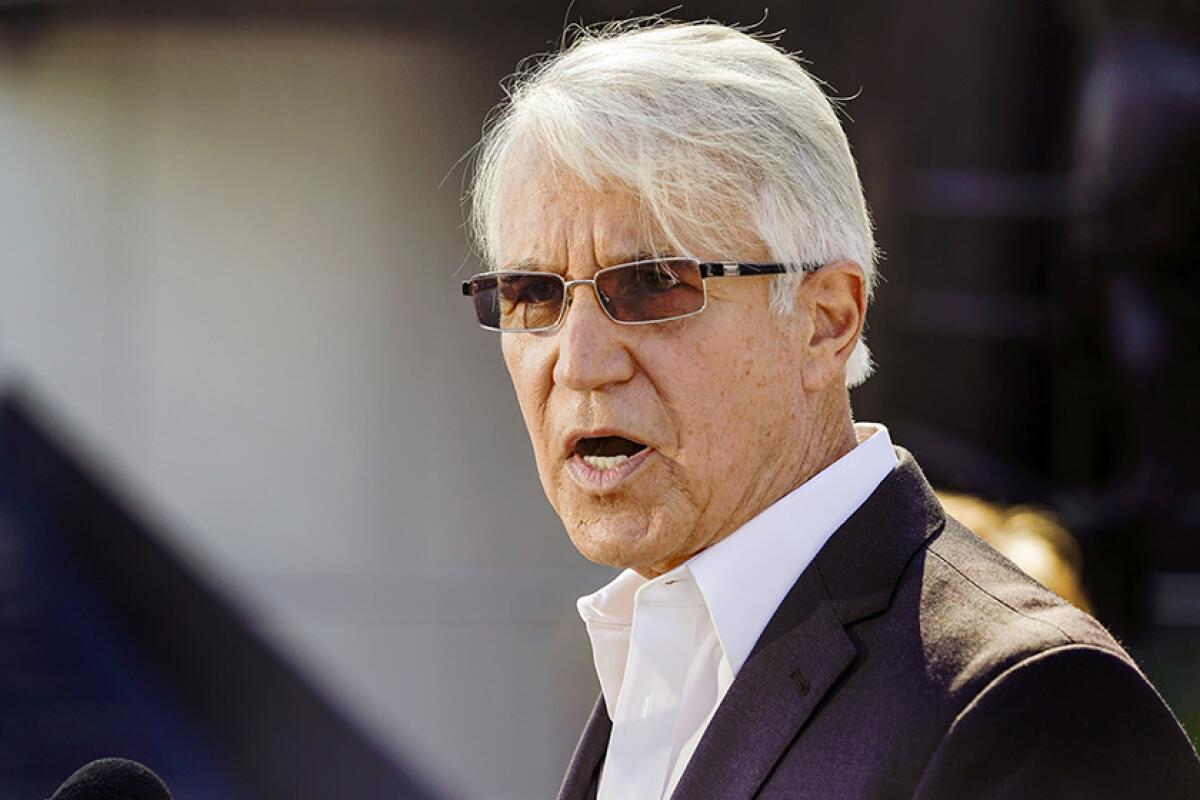Los Angeles County D.A. modifies policy on juvenile cases in wake of controversy

- Share via
Los Angeles County Dist. Atty. George Gascón has modified his blanket ban on trying juveniles as adults due to a pending state Supreme Court case and continuing backlash over a decision to allow a 26-year-old to plead guilty to sexually assaulting a child in juvenile court last month.
Under the new policy, which was circulated throughout the office on Tuesday, prosecutors must notify Chief Deputy Sharon Woo if a defense attorney seeks to move a case from adult court to juvenile court, and seek her permission to object to that motion. The document also directs prosecutors to notify Woo of cases where a defendant is “already an adult when proceedings are initiated in juvenile court.”
The latter circumstance seems to mirror the controversial case of Hannah Tubbs, who was sentenced to two years in a juvenile facility last month for sexually assaulting a child in Palmdale in 2014. Tubbs was 17 at the time of the crime, but was not linked to the assault until 2019, when her DNA was entered into a database due to an arrest in another state.
The decision to try Tubbs as a juvenile drew immediate condemnation from L.A. County Sheriff Alex Villanueva and L.A. County Supervisor Kathryn Barger. It also raised questions about the county’s failure to create a suitable housing setup for defendants who would have otherwise been sentenced to the state Division of Juvenile Justice. Gov. Gavin Newsom initiated steps to shutter the system, which largely housed older juvenile offenders convicted of violent crimes, in 2019.
In an interview on Wednesday, Gascón also said he is concerned that a case coming before the California Supreme Court this summer could lead to an expansion of the number of cases impacted by Proposition 57. The reform measure, which was voted into law in 2016, allows juveniles convicted in cases that were directly filed in adult court to retroactively seek what is known as a transfer hearing, in which prosecutors have to convince a judge the defendant should have been tried as an adult.
With few exceptions, such cases in L.A. County have resulted in those defendants being resentenced as juveniles and immediately released.
Gascón said Wednesday he is open to “evolving” his juvenile policy but stopped short of saying it would allow for expanded prosecutions of juveniles as adults. He also would not say if he has given any consideration to trying juveniles accused of extremely violent crimes as adults.
“The primary driver is cases coming back and the anticipation, quite frankly, for an increase in workload in this area,” Gascón said of the modified policy. “I’m going to continue to evaluate. I am a strong believer that juvenile justice has to be looked at differently than adults. But I also understand that we work in the environment that we work.”
Reactions to the policy change were mixed. Deputy Dist. Atty. John McKinney, a proponent of attempts to recall Gascón who has been critical of the way the Tubbs case was handled, issued several celebratory tweets Wednesday insisting the D.A. had bent to public pressure.
But Marketa Sims, an appellate attorney with the L.A. County Bar Assn.’s Independent Juvenile Defender Program who is involved in the Supreme Court case that Gascón referenced, said she did not believe the document hinted toward any substantive change in the office’s posture on prosecuting juveniles.
“I think they want to be aware of adults who are in juvenile court. It sounds like they want to be aware of those circumstances, but its not clear ... why,” she said.
Sims also said the county’s failure to create a replacement for the Division of Juvenile Justice has had a much larger impact on local juvenile justice issues than any policies Gascón has enacted.
Deputy Dist. Atty. Shea Sanna, who was the lead prosecutor on the Tubbs case, dismissed the directive as little more than public relations spin. He argued that managers will never allow prosecutors to seek a transfer hearing or oppose motions to move cases from adult court to juvenile court.
“I think it’s on paper to make it look like there will be a case-by-case analysis,” he said.
More to Read
Sign up for Essential California
The most important California stories and recommendations in your inbox every morning.
You may occasionally receive promotional content from the Los Angeles Times.











